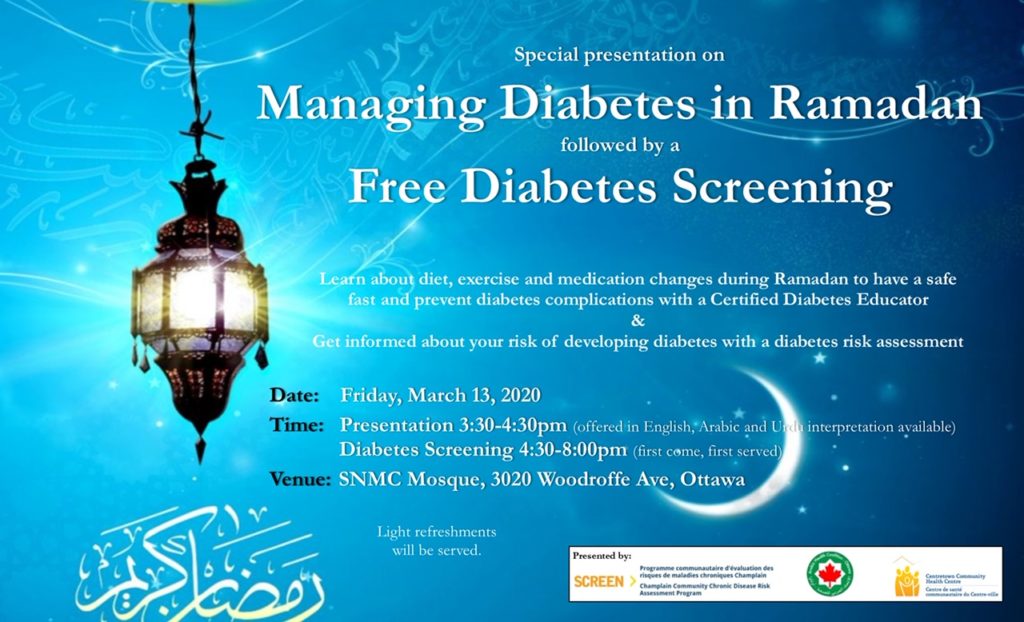
Managing Diabetes in Ramadan
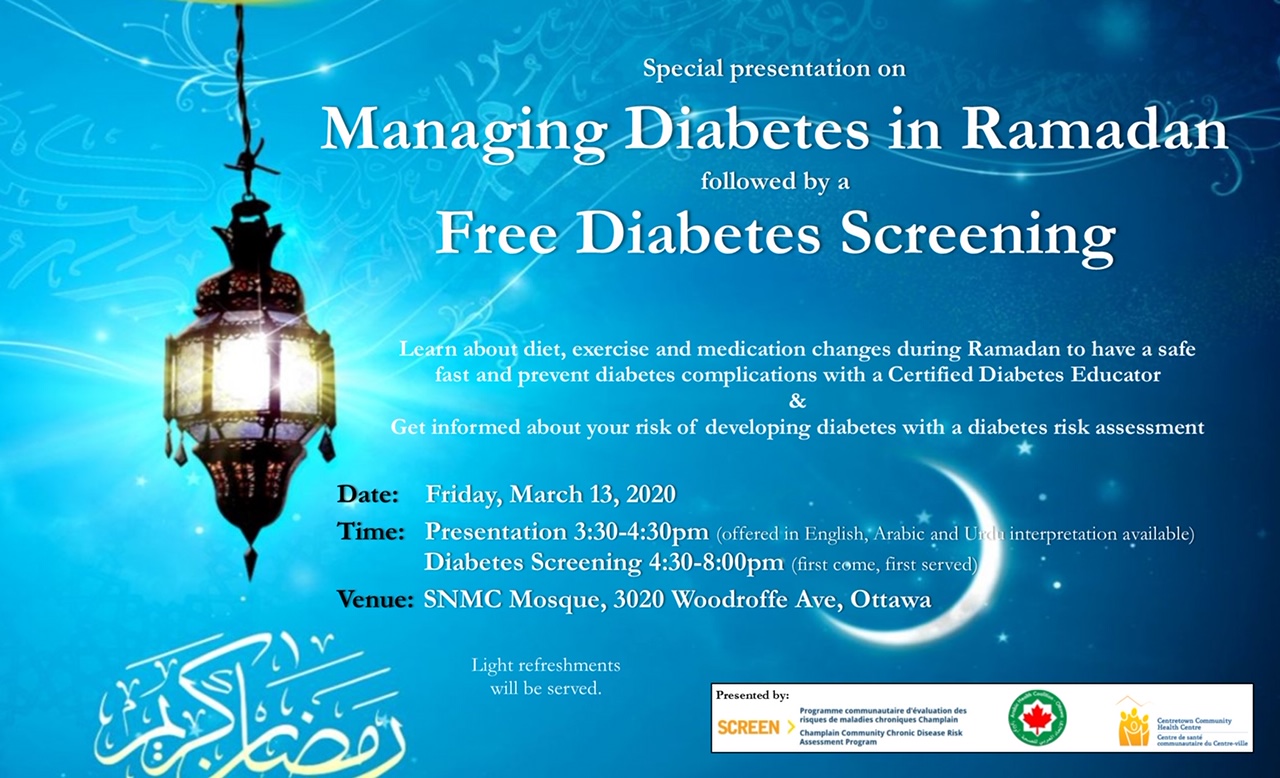



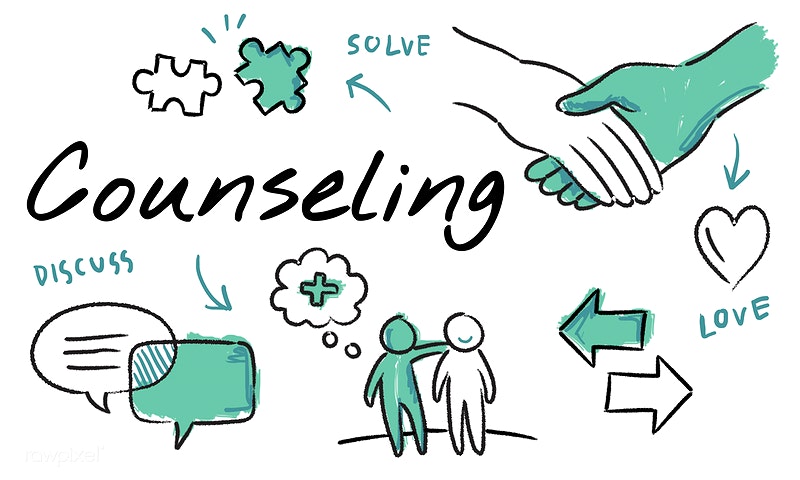
Schedule of imams for counseling Respected sisters and brothers, the two imams of SNMC are working hard and diligently to address the needs of SNMC community at individual as well as at the communal level.
Most of the community service programs require research and preparation time. In order to have a balance between community service and individual needs, the imams and the SNMC management agreed to have schedule for individual questions and meetings with the imams.
The imams will be available to meet with the individuals, couples and families on the following dates and times.
Imam Zijad:
Tuesdays: 4pm to 8pm
Wednesdays: 4pm to 6pm
Sundays: 4pm to 6pm
Imam Mohsen:
Mondays: 5pm to 9pm
Thursdays: 5pm to 9pm
Please send email to info@snmc.ca to book an appointment with any of the two imams. The duration of appointments will be 30 minutes. Please come on time and respect the time of the imams. Imams will use the rest of the their times on community service programs.

SNMC is pleased to offer a broad line-up of activities for your children during the March break. See the flyers below and register on a first come first serve basis.

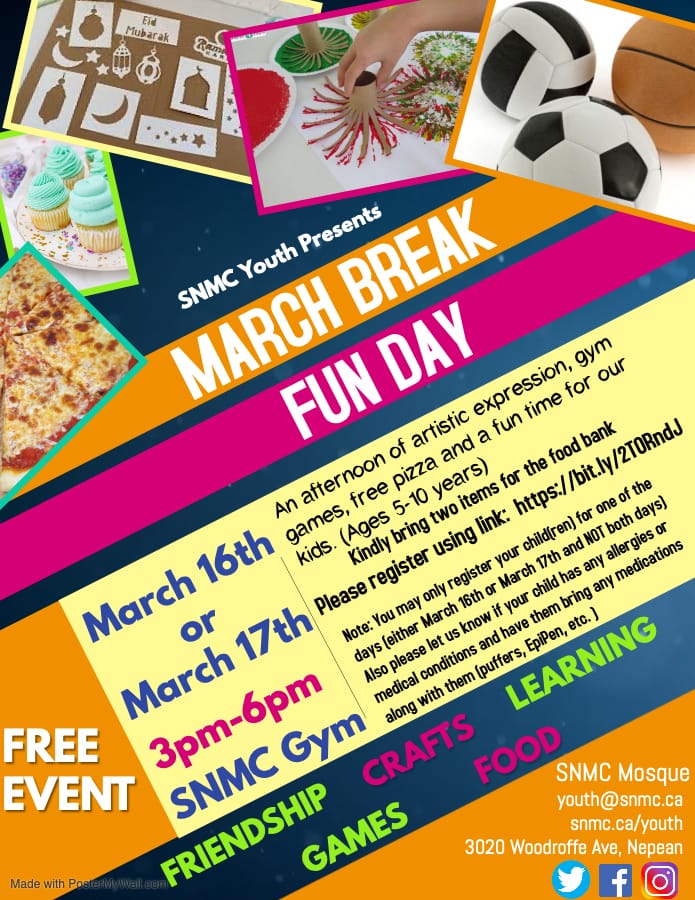
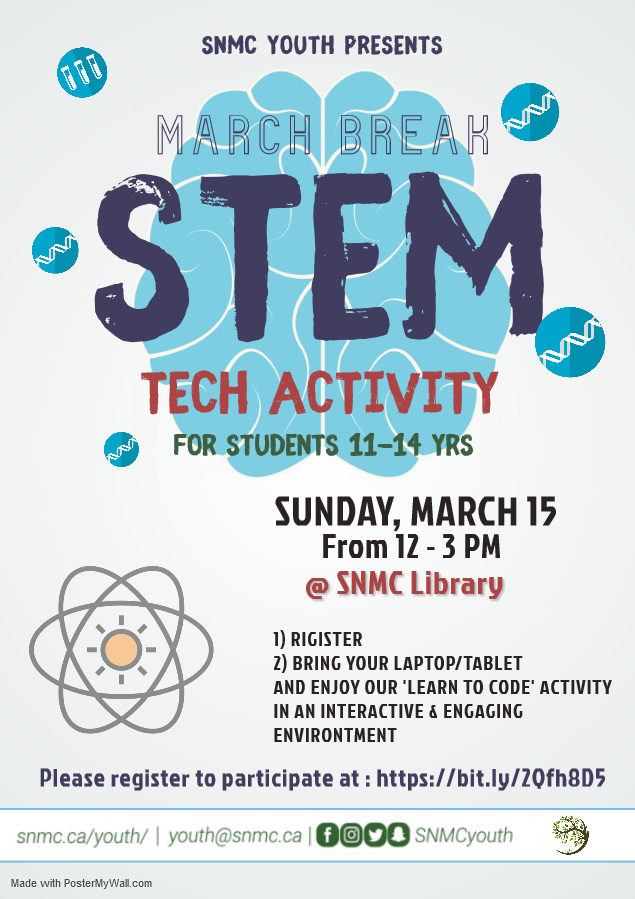
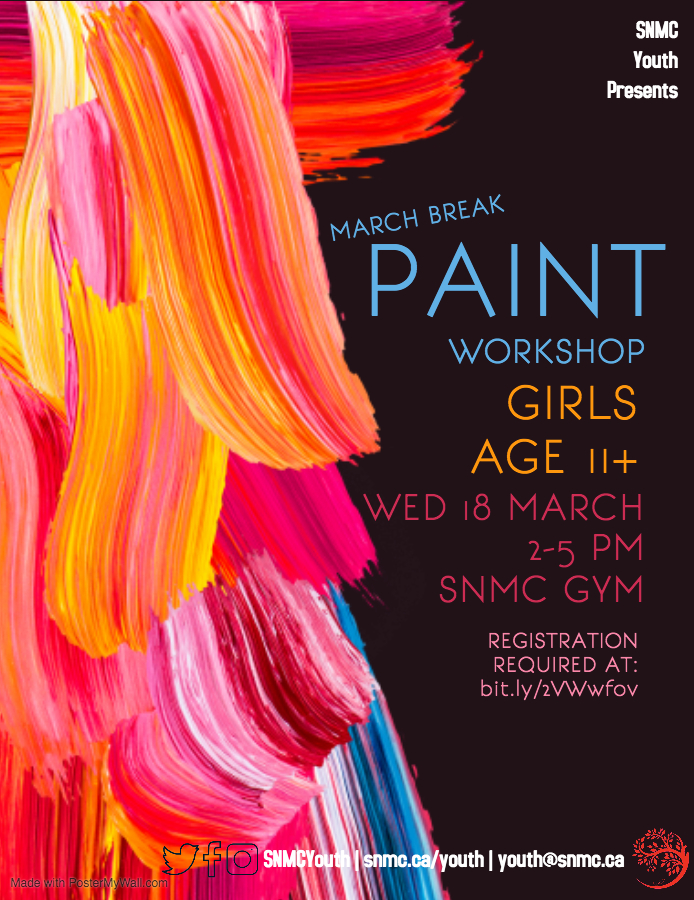


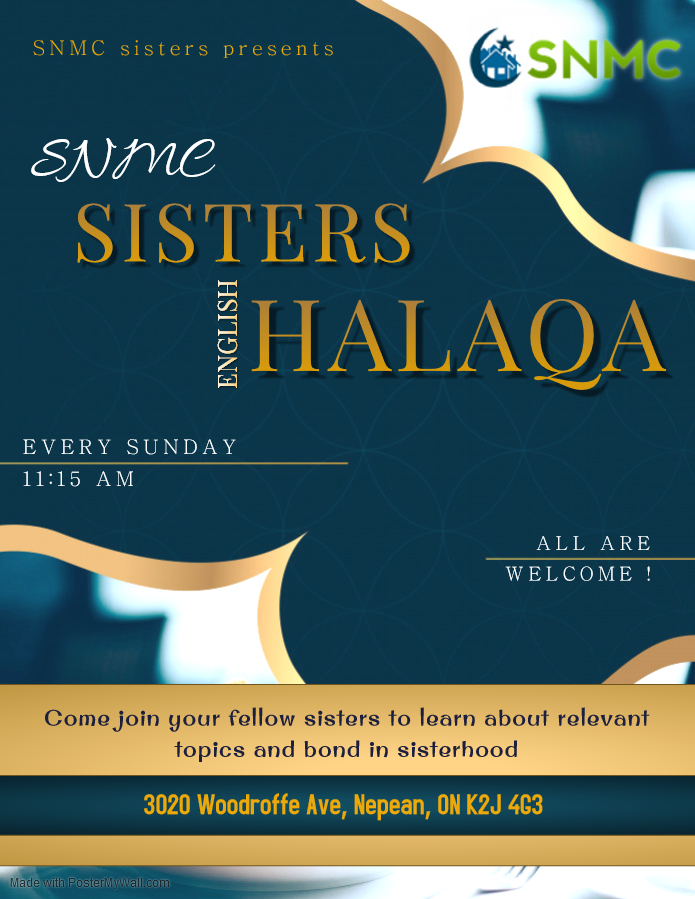
Assalamu alaikum Dear Sisters,
We are pleased to invite you all to a sisters’ halaqa with Shaykh Mohsen, our new Imam at SNMC.
He will be conducting a Special Halaqa for sisters on:
Date: Sunday Mar 15, 2020
Time: 11:15 am
Location: SNMC Masjid, in the basementLecture
Title: “How to bring Baraka in your life and find Peace and Happiness”
Come and join your sisters, learn about important subjects and reflect and bond with each other in the spirit of sisterhood. Light refreshments will be served.
We would be happy to meet you!
SNMC Sisters’ Committee
SNMC Masjid and Centre
3020 Woodroffe Ave
Ottawa, ONK2J 4G3



| SNMC Friday Night Lecture/Discussion on March 13th – Coronavirus Discussion and Guidance WHO: Experts/Professionals WHAT: How to Deal with the Coronavirus WHEN: Friday night, March 13th (after ‘Isha prayer SHARP) WHERE: SNMC Masjid/Mosque All are welcome to be part of this program and learn how to deal with the matters related to coronavirus from a Public Health, Canada Perspective as well as according to our Din. Akhlaq of a Muslim/Muslimah (manners, ethics, character) Session – Tuesday Weekly Session WHO: Imam Dr. Zijad WHAT: Manners with Allah: Tawakkul: Benefits WHEN: Tuesday, March 10th (After Salatil ‘Isha) WHERE: SNMC Main Prayer Area In general, the Goal for this weekly session is to discuss/teach/learn about the mentioned topics below (basic manners of Islam towards oneself, the Creator, people, the society) and inspire community members to live the learnt manners in their practical life on a day-to-day basis: • Rights of Allah – being a grateful servant of Allah, Worship Allah sincerely, Tawbah, Tawakkul, Taqwa, etc. • Rights of People – help them (truthful, sincere, keeping promise, etc) NOT harm them (envy, backbiting, slander, etc.) • Personal Rights – Takes care of spiritual, intellectual, ethical, emotional and physical development • Social Responsibilities – community and society: volunteering, interfaith relations, political engagement, etc. • Environmental responsibilities – taking care of the environment, soil, water, air Target Group: Public session – All Tafseer Surah Al-Hujurat WHO: Imam Dr. Mohsen WHAT: The nine advices of Surah Al-Hujurat WHEN: Saturday, March 14th (after ‘Isha prayer SHARP). WHERE: SNMC Masjid/Mosque. Family relationships – Sunday Weekly Session WHO: Imam Dr. Zijad WHAT: Neighbours in Islam WHEN: March 15th (After Salatil ‘Isha) WHERE: SNMC Main Prayer Area In general, the Goal for this weekly session is to enhance our knowledge on family relationships, supported with the Qur’an and Sunnah) and to assist Muslims to develop healthy environments in their home so that the potential of all members could be actualized. The following themes would be covered to reach the goals: • Pre-marriage/Nikah – What to look for in the search for finding a spouse in Islam • Marriage – Now when married, how to maintain a healthy relationship between wife and husband • Communication and Conflict resolution – What does it take to find ways of avoiding conflict in marriage and how assertive, sincere and open communication could be a key in having a marriage of substance • Parenting – Now when we are blessed with children in our marriages, we are to learn about ways of helping our future generation develop and maintain strong Islamic identity and at the same time honest, sincere and faithful citizens of the Canadian society, now our home. Target Group: Public session – ALL Day/Time: Sundays after ‘Isha prayer – Winter / Sundays after Magrib prayer – summer |

| SNMC JUMA PRAYER March 13th, 2020 (Two Khutbahs): 1st Khutbah 1:00 pm: Khateeb – Imam Dr. Zijad 2nd Khutbah at 2:15 pm: Khateeb – Imam Dr. Mohsen Jumah Prayer will be held @ the SNMC MASJID/CENTER, 3020 Woodroffe Ave, Barrhaven, Canada. |

Coronavirus prevention discussion SNMC management and imams would like to discuss any temporary measures related to Friday prayers/ Taraweeh as part of strengthening prevention against the outbreak of coronavirus. We’ll discuss various aspects including social and religious aspects and how to protect the community. We are hoping that we can do more to increase awareness and prevention against Coronavirus.
Discussion will be held on Friday March 13 at 7:30pm after maghreb at SNMC main prayer hall.

| Tie Your Camel First – Do Your ShareReported by Abu Huraira (r) that Muhammad that: “One day Prophet Muhammad (S) noticed a Bedouin leaving his camel without tying it. He asked the Bedouin, Why don’t you tie down your camel? The Bedouin answered, I put my trust in Allah. The Prophet (S) then said, “Tie your camel first and then put your trust in Allah.” (Tirmidhi)
Transliteration: “I’qilha, fatawakkal ‘alallah.” How many of us tie our camels first, before putting our trust in Allah? Muslims must never become fatalistic. Although we know only Allah is in control and that He has decreed all things, we are each responsible for making the right choices and doing the right thing in all situations of our lives. We must take action. We must work to alleviate the hardships that we face. We must remember that while we need to carry out our duties to the best of our abilities, we always also need to remember that we don’t control the outcome of events. Even the Prophets did not control the outcome of their efforts. Some were successful, others were not. Once we have done our duty, let’s leave the results to Allah. Regardless of the results, we will be rewarded for our good intentions and the actions that followed those intentions. We cannot control what happens to us but we can control our reaction to our circumstances. |

CORONAVIRUS (COVID-19)
What is the current situation in Ottawa, Ontario — Canada?
(The material is compiled from the sources of Ottawa Public Health, Ontario Government, Public Health Canada and World Health Organization with the link to their web pages)
https://www.ontario.ca/page/2019-novel-coronavirus
https://www.canada.ca/en/public-health.html
https://www.ottawapublichealth.ca/en/public-health-topics/novel-coronavirus.aspx
https://www.who.int/emergencies/diseases/novel-coronavirus-2019/advice-for-public
Introduction to Coronavirus
There are currently no confirmed or presumptive positive cases of novel coronavirus (COVID-19) in Ottawa. In Canada, there are 30 confirmed cases of coronavirus as of March 4th, 2020 – 20 in Ontario, 9 in BC and 1 in Quebec.
Every week day at 10:30 a.m. ET, the Province of Ontario’s novel coronavirus (COVID-19) web page https://www.ontario.ca/page/2019-novel-coronavirus will be updated with the most up-to-date information including the status of cases in Ontario.
Background and Origin
On December 31, 2019, a cluster of cases of pneumonia in Wuhan, China (Hubei province) was reported to the World Health Organization and the cause has been confirmed as a new coronavirus that has not previously been identified in humans.
The current situation is evolving. More information is expected to emerge in the coming days and weeks. New information is becoming available daily and a clearer picture is being formed as this information is analyzed by provincial, national and international health agencies.
Canada’s Government Public Health
Stay up to date on emerging travel health notices from the Government of Canada https://www.canada.ca/en/public-health.html
The Novel Coronavirus (COVID-19) situation is evolving rapidly. Outbreaks of COVID-19 are being reported throughout the world. Mainland China (including Hong Kong) is the primary location where COVID-19 infections are spreading. However, other areas such as Iran, Northern Italy, Japan, Singapore, and South Korea are now reporting spread of COVID-19 within the community.
Advice to Travellers returning to Ottawa from affected areas
If I recently travelled outside of Canada, when should I contact a doctor, Ottawa Public Health or a health care professional?
Travellers who have returned from Hubei province (China) and Iran should:
If you have travelled to other affected areas (e.g., mainland China [excluding Hubei province], Hong Kong, Japan, Italy, Singapore, South Korea), you may have come in contact with the novel coronavirus (COVID-19). For 14 days after the day you left the affected area, the Public Health Agency of Canada asks that you:
If you start having symptoms, isolate yourself from others as quickly as possible. Immediately call a health care professional or Ottawa Public Health (613-580-6744). Describe your symptoms and travel history. To further protect those around you, wash your hands often and cover your mouth and nose when coughing or sneezing.
You will need to stay home and self-isolate if:
You have a confirmed 2019 Novel Coronavirus (COVID-19) infection and do not need hospitalization and can receive care at home.
You are being assessed for the 2019 Novel Coronavirus (COVID-19) infection by a healthcare provider.
What is the risk to residents of Ottawa?
The Public Health Agency of Canada has assessed the public health risk associated with the current novel coronavirus (COVID-19) infection in Wuhan, China as low for Canada. Public health risk is continually reassessed as new information becomes available.
How is Ottawa Public Health monitoring the novel coronavirus (COVID-19) situation?
Ottawa Public Health is following the lead of the Ontario Ministry of Health, Public Health Ontario, and the Public Health Agency of Canada in responding to the novel coronavirus (COVID-19). Ottawa Public Health has a strong partnership with local hospitals who have put measures in place to screen individuals who are suspected of being infected by the novel coronavirus (COVID-19). Please read signs and follow all instructions when visiting a hospital.
The Ministry of Health has added novel coronavirus (COVID-19) as a designated disease reportable under Ontario’s public health legislation. Now, physicians, hospitals and other care facilities will be required to report a suspected or confirmed case of the novel coronavirus (COVID-19) to their local Medical Officer of Health.
If a suspected or confirmed case of novel coronavirus (COVID-19) were to be identified in Ottawa, Ottawa Public Health would work with the Ministry of Health, Public Health Ontario Laboratory, and local hospitals in the management of the case and any contacts.
How can you protect yourself and your family?
To reduce the spread of germs including the flu and the novel coronavirus (COVID-19) we recommend that you:
Symptoms of the 2019 novel coronavirus (COVID-19)
The novel coronavirus (COVID-19) can cause:
If your symptoms are MILD
If your symptoms are SEVERE
If you cannot reach your Health Care Provider,
Other frequently asked questions – please visit the following link https://www.ottawapublichealth.ca/en/public-health-topics/novel-coronavirus.aspx
World Health Organization (WHO): Basic protective measures against the new coronavirus
Stay aware of the latest information on the COVID-19 outbreak, available on the WHO website https://www.who.int/emergencies/diseases/novel-coronavirus-2019/advice-for-public and through your national and local public health authority (as above). COVID-19 is still affecting mostly people in China with some outbreaks in other countries. Most people who become infected experience mild illness and recover, but it can be more severe for others. Take care of your health and protect others by doing the following:
1. Wash your hands frequently
Regularly and thoroughly clean your hands with an alcohol-based hand rub or wash them with soap and water.
Why? Washing your hands with soap and water or using alcohol-based hand rub kills viruses that may be on your hands.
2, Maintain social distancing
Maintain at least 1 metre (3 feet) distance between yourself and anyone who is coughing or sneezing.
Why? When someone coughs or sneezes they spray small liquid droplets from their nose or mouth which may contain virus. If you are too close, you can breathe in the droplets, including the COVID-19 virus if the person coughing has the disease.
3. Avoid touching eyes, nose and mouth
Why? Hands touch many surfaces and can pick up viruses. Once contaminated, hands can transfer the virus to your eyes, nose or mouth. From there, the virus can enter your body and can make you sick.
4. Practice respiratory hygiene
Make sure you, and the people around you, follow good respiratory hygiene. This means covering your mouth and nose with your bent elbow or tissue when you cough or sneeze. Then dispose of the used tissue immediately.
Why? Droplets spread virus. By following good respiratory hygiene you protect the people around you from viruses such as cold, flu and COVID-19.
5. If you have fever, cough and difficulty breathing, seek medical care early
Stay home if you feel unwell. If you have a fever, cough and difficulty breathing, seek medical attention and call in advance. Follow the directions of your local health authority.
Why? National and local authorities will have the most up to date information on the situation in your area. Calling in advance will allow your health care provider to quickly direct you to the right health facility. This will also protect you and help prevent spread of viruses and other infections.
6. Stay informed and follow advice given by your healthcare provider
Stay informed on the latest developments about COVID-19. Follow advice given by your healthcare provider, your national and local public health authority or your employer on how to protect yourself and others from COVID-19.
Why? National and local authorities will have the most up to date information on whether COVID-19 is spreading in your area. They are best placed to advise on what people in your area should be doing to protect themselves.
7. Protection measures for persons who are in or have recently visited (past 14 days) areas where COVID-19 is spreading
Follow the guidance outlined above.
* Stay at home if you begin to feel unwell, even with mild symptoms such as headache and slight runny nose, until you recover.
Why? Avoiding contact with others and visits to medical facilities will allow these facilities to operate more effectively and help protect you and others from possible COVID-19 and other viruses.
* If you develop fever, cough and difficulty breathing, seek medical advice promptly as this may be due to a respiratory infection or other serious condition. Call in advance and tell your provider of any recent travel or contact with travelers.
Why? Calling in advance will allow your health care provider to quickly direct you to the right health facility. This will also help to prevent possible spread of COVID-19 and other viruses.